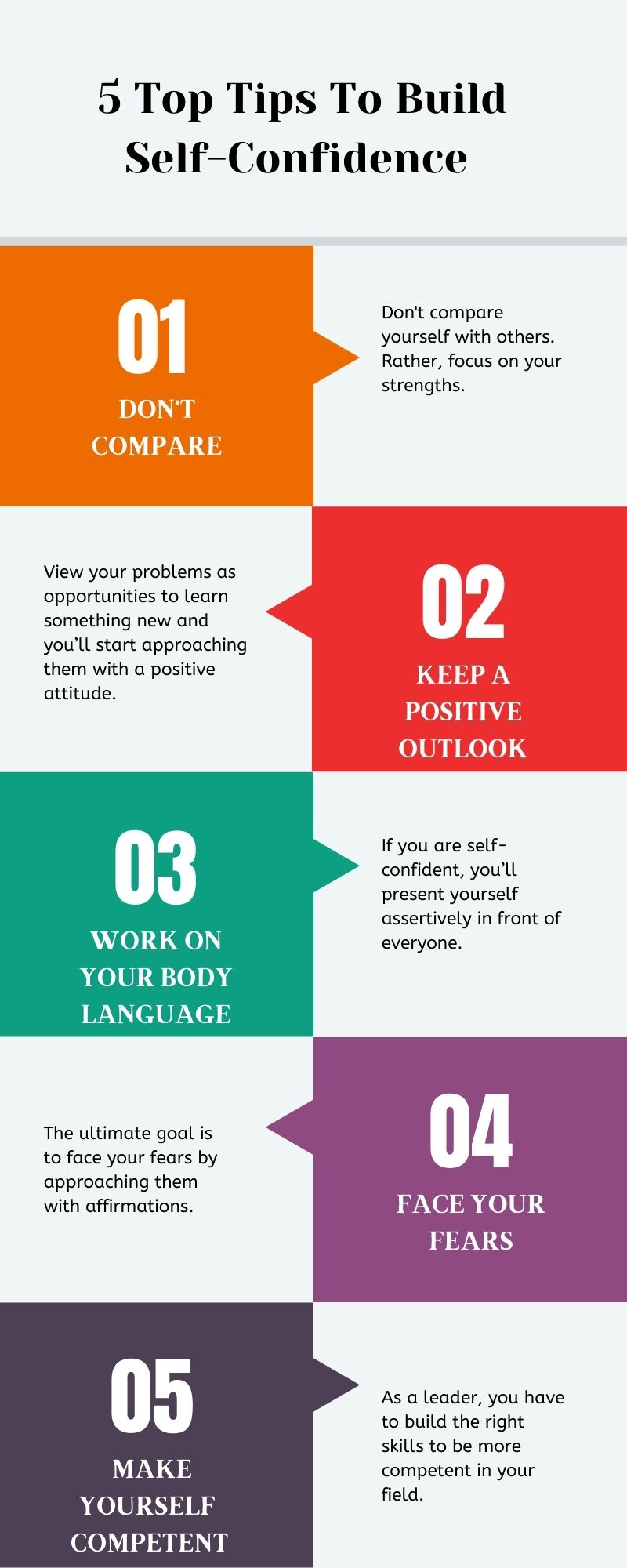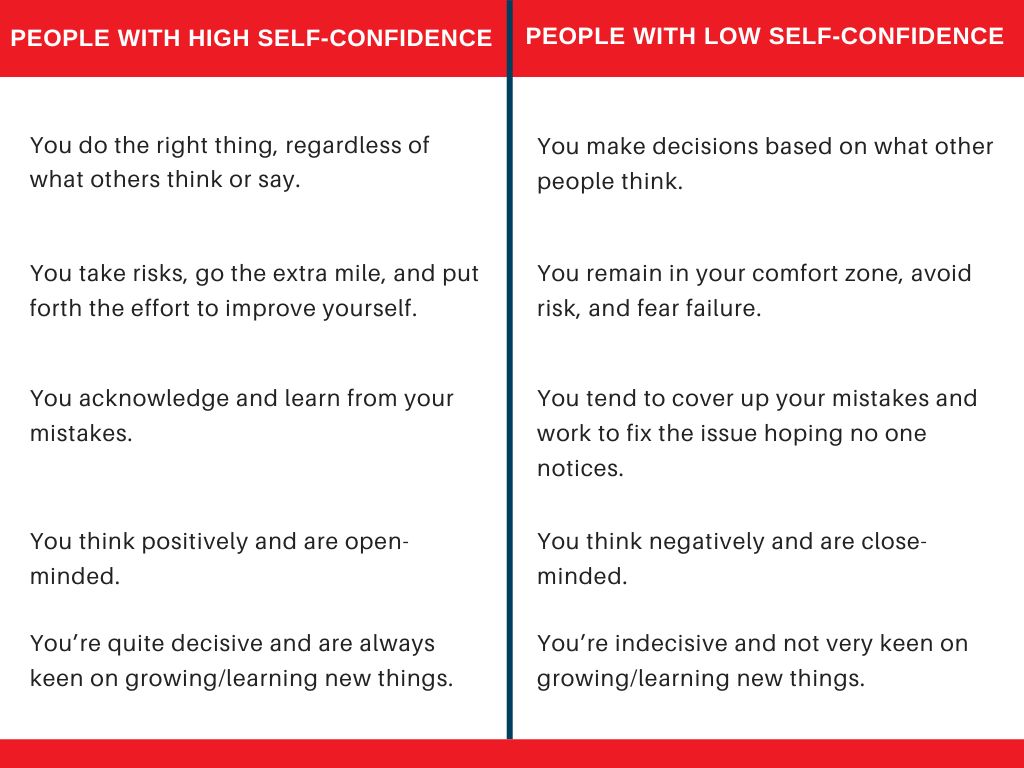Why is self-confidence important? Why self-confidence matters? Let’s find out the answers for ‘how you can build unshakeable self-confidence’ to climb up the success ladder.
“All you need is ignorance and confidence and success is sure.”
– Mark Twain
The age-old adage about self-confidence depicts that even though we are not born with it, we can build self-confidence. It is a matter of inculcating some best practices into our daily routines that can lead us to our way of being more confident and successful.
As a student or an employed individual, self-confidence matters to your emotional and physical well-being. It enhances your ability to be more efficient, tackle challenges, and lead a fulfilling life.

First, let’s understand what self-confidence means?
Self-confidence is your sense of self-trust, acceptance, and control over your life. You may find you are confident in some areas like academics, but lacking confidence in others, such as relationships. A guitarist who knows that they can play a song really well is an example of self-confidence. It has something to do with one’s belief in one’s abilities.
Has it ever occurred to you that you want your dream job but are not sure whether you’ll crack the interview? Self-doubt seems to rule your thinking capacity and your ability to succeed in that particular endeavor. Studies1 have shown that people who are more confident tend to do better academically and professionally.
Now, let’s learn why self-confidence is important?
The need for self-confidence pervades every aspect of our lives. However, many people struggle to find it. Struggling with self-confidence is normal and we all tend to face it at one or the other point in life. It can become a vicious cycle: people who lack confidence are less likely to achieve the success which can lead to greater self-confidence.
For example, your chances of getting through an interview scale up when you communicate clearly, hold your head high, look people in the eye, and answer questions with assurance.
You can easily gain the confidence of others if you have self-confidence, and that can help you succeed in whatever you do. It is important to know how you behave when faced with a difficult situation.
Let’s examine how a confident person acts and how an individual who’s low on confidence behaves. Do you identify with any of the following traits?

Having known the above-mentioned traits, you can easily identify the areas that you need to work upon to be more confident.
Do you want to build self-confidence that is unshakeable? Here are the top five steps to help you build self-confidence:
Don’t Compare Yourself With Others
Do you feel jealous when you look at your friends who are doing well in their lives? Do you compare your salary to that of your relatives? It is natural to compare, according to the social comparison theory. However, it prevents you from being self-confident, and you end up feeling more distressed.
What can you do to stop drawing comparisons? Simply remind yourself that everyone is unique and you can’t compare your life with other people’s lives. You are responsible for creating your own path of success and comparisons don’t help. Focus on your abilities and what you have to enrich your life. Be grateful for things and make efforts to achieve your goals. By practicing it regularly, you’ll actually stop comparing yourself with others and feel more content with your life.
Keep A Positive Outlook

“Whatever you hold in your mind on a consistent basis is exactly what you will experience in your life.”
– Tony Robbins
Most of the time we tend to behave and act according to our beliefs. What we constantly think in our minds is what leads to self-doubt or success. If we learn how to uncover our beliefs, we can surely turn around how we behave. It depends on what kind of questions you ask yourself.
Do you ask questions like, “Why am I not successful?” or “Am I not good enough to achieve my goals?” or “What do other people think of me? Do they view me as a failure?” Such questions will not help you gain confidence.
But if you maintain a positive outlook and ask yourself questions like, “How can I turn my dream into reality?” and “What are the strengths that will help me succeed?” By asking yourself better questions, you get better answers. It will help improve your overall mental health too.
The crux of building self-confidence is that if you approach a challenge knowing that you can overcome it, then that’s exactly how you’ll act. View your problems as opportunities to learn something new and you’ll start approaching them with a positive attitude.
Work on your body language
Non-verbal communication is just as important as verbal communication. What you don’t say reflects in your actions and body language. If you are not confident, you’ll try to hide by slouching, hunching your shoulders, putting your head down, or you’ll keep fidgeting, not make eye contact, and keep your arms crossed.
But if you are self-confident, you’ll present yourself assertively in front of everyone. Sit upright in meetings, show your palms to the audience during presentations, and be open to sharing ideas.

Some negative body language signs:
- Folded arms.
- A tense facial expression.
- Body not positioned toward you.
- Looking at the walls, no eye contact.
- Biting nails.
- Locking ankles/shaking your feet.
- Blinking quickly.
- Fidgeting/tapping fingers.
- slouching/hunching.
Some positive body language signs:
- Smiling when you talk.
- Maintaining eye contact.
- Having an open posture.
- Greeting people with a firm handshake.
- Avoid touching your face/nose.
- Keep your body turned toward the person you are talking to.
Face Your Fears
Success lies ahead of fears. If you keep postponing your decision of facing your fears, you won’t be able to attain success. For example, if you have to apply for a promotion, or ask for a salary raise, don’t sit on it forever just because you’re afraid of asking for something that you deserve. One of the best ways to regain self-confidence is to face your fears.
If you fear appearing in an interview, practice in front of the mirror, imagine yourself in front of the panel answering questions. Take deep breaths before you actually go for the interview. It’s okay to feel nervous and perhaps some self-doubt can help enhance performance.
Experiment with ways of making it happen and learn from your mistakes. Every time you practice, you gain more self-confidence. The ultimate goal is to face your fears by approaching them with affirmations.
Make Yourself More Competent
Your skillset forms an integral part of your competency, which is the ability to perform effectively. If you don’t have sufficient experience in a particular area, it doesn’t mean that you should feel incompetent and less confident in doing things.
As a leader, you have to build the right skills to be more competent in your field. You can start by making a list of the skills and competencies that you’d like to develop. You can ask people who you believe are good at those skills to mentor you and help you grow. You can always keep on learning and growing your skills and competencies.
You can work on yourself using sources available like online courses, self-help books, or joining some groups of like-minded people. Experience new challenges to test your learnings. It will help boost your confidence as you resolve more problems.
Conclusion
Now that you know the five easy methods – how to have high self-confidence, you can start following these. Upskilling or reskilling also forms an important part of building self-confidence.
ABM College’s diverse programs in Technology, Healthcare, and Business can help you get equipped with industry-relevant skills to be job-ready once you graduate and face the corporate world confidently.
Want to build your self-confidence? Ask us how!
Visit our blog for more employment tips.
References
- Stankov L, Morony S, Lee YP. Confidence: The best non-cognitive predictor of academic achievement?. Educat Psychol. 2014;34(1):9-28. doi:10.1080/01443410.2013.814194
About The Author

Private Career College
ABM College is a leader in career-focused education, committed to empowering students with industry-relevant skills. With expert instructors and practical training, ABM College delivers high-quality programs in health, business, technology, and more, ensuring graduates are prepared to meet workforce demands. Known for its supportive learning environment and a focus on real-world application, ABM College is a trusted educational partner helping students achieve professional success across Canada.
